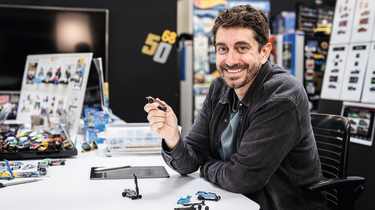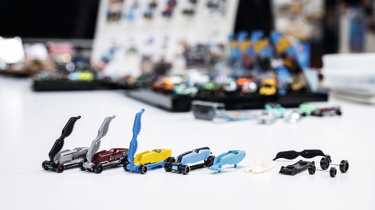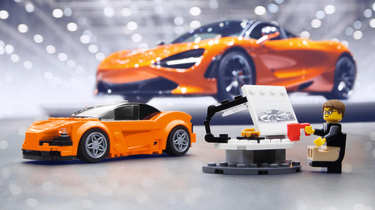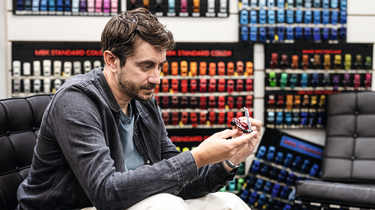Think Hot Wheels car designs are crazy? Meet the man responsible
How designer and car nut Craig Callum found his dream job as head designer at Hot Wheels
We're coming up to the end of the year, so we can assume that Craig Callum has already designed around 60 cars in 2024. Not even the Chinese automotive brands produce this many new cars a year, so where is it that Callum is working? The answer is Mattel, makers of the legendary Hot Wheels model cars that many of us grew up with. But before we get into the fascinating story of a designer whose life and career have followed a very different course to most in his trade, we must deal with his surname.
Much to my surprise, fellow Scots Craig and Ian Callum are not directly related. ‘There are two designers in particular who have had an enormous influence on me and who both have become friends,’ says Callum. ‘One is Ian and the other is Peter Stevens. I’d wanted to be a car designer since I was five years old but nobody in my family did anything remotely similar so I had to find my own way. In my teens I heard about the automotive design course at Coventry University and thought that drawing cars was my sort of university degree.
‘Before going to Coventry, when I was 17, I turned up at Peter Stevens’ studio in my classic Mini and literally doorstepped him. In his studio, which is a converted barn, there were model cars, books, nick-nacks, bits and pieces of cars and sketches on his desk. I’d grown up in a normal house and hadn’t seen this sort of thing. What also struck me about Peter is the variety of his work over the years. From designing one of the most famous supercars of all time, to trams, to racing car liveries. This showed me the breadth of design and how varied a career you could have. He has been an inspiration and mentor over the years and we have stayed friends ever since.’
While at Coventry, Callum bagged an internship at Gibbs Automotive, the firm behind the Aquada amphibious car. ‘I was one of the lucky ones,’ he says, ‘because Gibbs offered me a full-time job, so I went straight from university into work. They’d done the Aquada by the time I got there so I was working on something called the Quadski, a quad bike that turned into a jet ski. It was a lot of fun working there and I felt a bit like Q out of James Bond. After Gibbs, I did some consultancy work designing headlights for a Chrysler facelift and a bit on the Bugatti four-door concept. It was a mix of everything so good experience, but ultimately not rewarding.’
More to Callum’s liking was a move to Renault Trucks in Lyon. ‘With trucks you’re really thinking about how the drivers live in the vehicle, not just drive it. Function is so important that it has to be incorporated into the aesthetics of the cab. What might look cool might not necessarily be easy for the driver to live with. I worked there for four years and found it a really good learning experience.’
Then came a career crisis. ‘I kind of fell out of love with the automotive design world a little bit. It’s very competitive and you’re always fighting for a project and then to be the lead designer, and that’s not really me. I’m competitive with myself, but not necessarily against others. I’m more about celebrating what others are doing.
‘So after Renault I went mountain biking in the French Alps on what was meant to be a three-week break to gather my thoughts. Three weeks somehow turned into three years of biking and snowboarding. I was essentially bumming around and deciding what to do because, you know, when you’ve wanted to be a car designer since the age of five and then you have doubts about that career, what else are you going to do?’
Callum considered being a snowboard instructor but then a call came from Denmark. ‘This guy from Lego phoned and told me one of my friends had shown them my portfolio. He asked if I would be interested in joining the team and helping out with the Mindstorms products. Mindstorms is a very techie version of Lego with motors and sensors and a facility for programming them, so you can literally create a robot using it. It sounded really interesting but I wasn’t too sure because the snow season was about to start, but the Lego people said I could work from the Alps. So I ended up freelancing for them for a year, living in the Alps, designing Lego.’
It proved to be something of an epiphany for Callum, re-igniting his passion for design. ‘Pretty soon I realised that the world of toys was a place I wanted to be. You design something and then a year later you see the finished product in the shops. Also, you’re generally in charge of one product, so when that product hits the shelves you know it’s the result of your work and that it’s having an impact in the world through your design. Then there’s the thought that children will grow up with stuff that you designed and it becomes a really big part of their nostalgia package. Lego and Hot Wheels are toys that I played with as a kid.’
Callum applied for a full-time job at Lego, moved to Denmark and spent the next nine years designing a variety of toys. ‘Automotive toys were missing from the Lego portfolio so I helped the company develop the Speed Champions series that’s still going strong today and includes many well-known supercars and sports cars.
‘Towards the end of my time at Lego I felt the work was beginning to repeat itself. I went back to Coventry University as a director of the National Transport Design Centre. It only took six months there to realise that it was at the opposite end of the scale that I was used to. I was running a team researching things for years that may never go anywhere.’
As he pondered his next move, Callum’s life was turned upside down by a huge motorcycle accident. ‘I was up in Scotland and damned nearly died in this accident. It took two years to fully recover from it and towards the end of that period I was still a bit lost, not sure what to do. So I built a campervan and spent a year on the road, doing a bit of freelancing. Eventually it dawned on me there was only one place you could go after you’ve worked at Lego and that was to Hot Wheels. If you’re a car designer who’s into toys it’s the company to work for. So I reached out to them, showed them what I’d done so far and they said they’d find a place for me.’
The position that Mattel found for Craig was design manager on die-cast models. ‘I’m in charge of all die-cast models, which is everything from the main-line basic models that you see on supermarket shelves for $1 to the premium adult die-casts.’
The job involved Callum moving to LA where, presumably, he’s never short of inspiration. ‘Absolutely. It’s almost overwhelming here. Every avenue of the automotive world you can imagine is on your doorstep every weekend. You want to see some JDM cars? There’ll be a meet on somewhere for them. If you want to see hot rods racing on the dirt, then you can. That’s what I did last weekend. I can go into work on a Monday and think, “My mind’s a bit empty,” then simply go to a breakfast meet somewhere and see everything from a classic Mini to a supercar.’
Around 70 per cent of the models that Callum and his team produce are licensed cars from companies such as Porsche, Lamborghini and Aston Martin. The remaining 30 per cent are original models for which the team can unleash their full creativity. ‘We have a huge range of different vehicles, some of which are really fantastical, like our foodie cars where we might have a slice of cake turned into a hot rod. My first design here was called the Mo‑Stash. It’s like a Bonneville salt speedster-type car with a comb down the middle that flicks out.’
It seems that Callum’s footloose life might be behind him though. He’s been at Hot Wheels for just over a year and a half and already at his Southern California home he has a collection of seven motorcycles, his classic Mini now shipped over from the UK, a 1928 Ford Roadster and a 1931 Ford Model A coupe. ‘I had a Matchbox Ford Model A hot rod when I was a kid,’ he says. Further proof that when you design toy cars you’re inspiring kids and creating nostalgic reference points for their future.
This story was first featured in evo issue 325.







